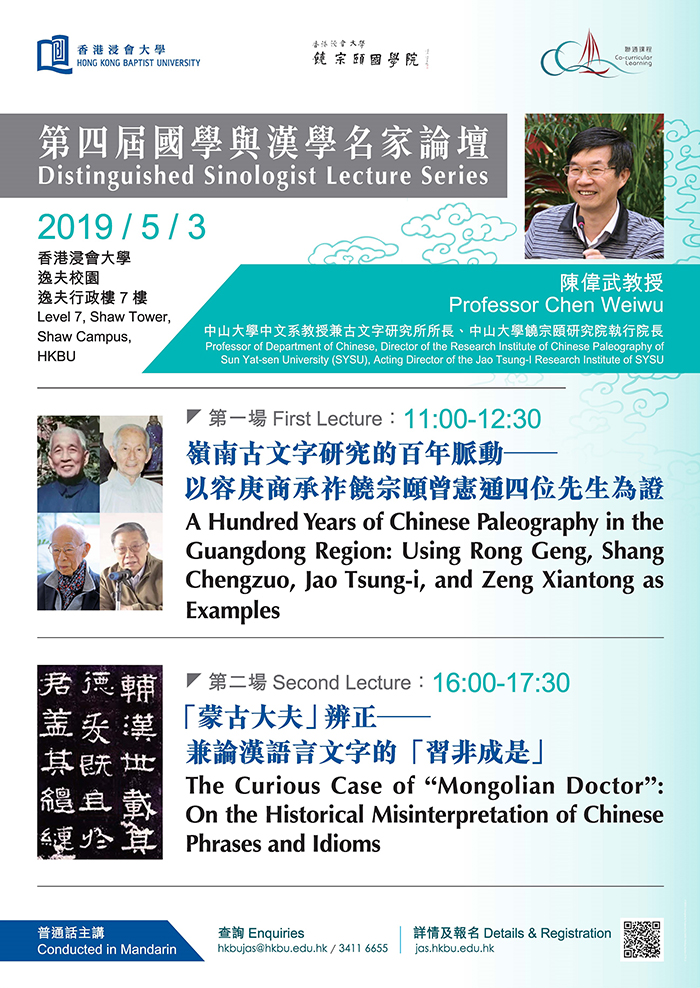Distinguished Sinologist Lecture Series – Prof. Chen Weiwu

The Hong Kong Baptist University Jao Tsung-I Academy of Sinology is honoured to invite Professor CHEN Weiwu, Professor of Department of Chinese, Director of the Research Institute of Chinese Paleography of Sun Yat-sen University (SYSU), Acting Director of the Jao Tsung-I Research Institute of SYSU, to speak for Distinguished Sinologists Lecture Series. Event details are as follows:
Date: 3 May 2019 (Friday)
Venue: Jao Tsung-I Academy of Sinology, Level 7, Shaw Tower, Shaw Campus, HKBU, 34 Renfrew Road, Kowloon Tong
Language: Mandarin
*Both lectures are listed as HKBU's Co-curricular Learning activities.
First Lecture: 11:00am-12:30pm
A Hundred Years of Chinese Paleography in the Guangdong Region: Using Professors Rong Geng, Shang Chʻeng-tso, Jao Tsung-i, and Zeng Xiantong as examples
Abstract:
Looking back at the last hundred years of Chinese Paleography, the Guangdong Region (with Hong Kong included) has produced some of the best paleographers in the country and their influence is still felt today. It is imperative for contemporary researchers to review their scholarship from the perspective of disciplinary history in order to learn from their methodology and experience and to trace the traditions and changes in this field of expertise. This talk will offer a critical retrospective on the development of Chinese Paleography in the Guangdong Region in the last century by focusing on four exemplary figures, namely Professors Rong Geng (1894–1983), Shang Chengzuo (1902–1991), Jao Tsung-i (1917–2018), and Zeng Xiantong (b. 1935).
Second Lecture: 4:00pm-5:30pm
The Curious Case of “Mongolian Veterinarian/Charlatan”: On the Historical Misinterpretation of Chinese Phrases and Idiomatic Expressions
Abstract:
The Chinese phrase “Měnggǔ dàifu” (lit. “Mongolian doctor”) was traditionally synonymous with “charlatan”, or as some scholars explain, “doctor with poor medical skills.” However, the present speaker believes the phrase has nothing to do with Mongol or Mongolian: “Měnggǔ” is probably a misreading of the close homophone “mēnggǔ” (lit. “blind” or “dim-sighted”) which describes someone ignorant and illiterate. As a whole, “měnggǔ dàifu” refers to a quack or a doctor that is too poorly skilled and ignorant to be qualified as one. Considering that Professor Jao Tsung-i already pointed out the personal name “Mào Gǔ” in the Warring States period (453–221 BCE) is cognate with the adjective “móhu” (blurry), I further purpose that “mēnggǔ” and “móhu” are cognates.
In fact, there are many incidents of historical misinterpretation of phrases and idioms like the “Měnggǔ dàifu” given that the Chinese writing system is logographic instead of syllabic. The talk tries to account for the various reasons behind such phenomenon and analyzes individual cases according to groups, the largest of which is of course (close) homophones. It will offer a preliminary discussion of the nature of the phenomenon and touch on the standardization of the Chinese language.
About the speaker
Born in Chenghai District, Guangdong Province, Chen Weiwu studied under Prof. Pan Yunzhong and Prof. Zeng Xiantong during his postgraduate training. He received his Ph.D. degree at Sun Yat-sen University (SYSU), Guangzhou, in 1994 and worked at his alma mater ever since. Prof. Chen became Associate Director of SYSU’s Research Institute of Chinese Paleography in 1999 before being promoted to Research Fellow in 2000, Doctoral Supervisor in 2001, and Full Professor (Department of Chinese) in 2003. He is presently serving in the capacity of Director of both the aforementioned Research Institute of Chinese Paleography and the SYSU branch of the Collaborative Innovation Centre of Unearthed Documents and Ancient Chinese Civilization Studies, Director of the Chinese Language Society (PRC), Director-cum-Secretary-General of the Society of Chinese Paleography, Executive Director of the Society for the Study of Chinese Writing, Vice President of the Associação de Caracteres Chineses de Macau, Acting Director of the Jao Tsung-I Research Institute of SYSU, and board members of the Academic Advisory Board of the National Museum of Chinese Writing, Anyang and the International Society of Teochew Studies. His other professional services include serving in the Editorial Board of scholarly journals such as the Huaxue, Bamboo and Silk(Chi. version), Zhongguo wenzi xuebao, and Zhongguo wenzi (Taipei) and serving as Chief Editor of the Guwenzi luntan. Over the years, Prof. Chen led a number of state-level research projects funded by PRC’s National Social Science Foundation and Ministry of Education, including the “Compilation of the Compendium of Annotations and Exegetical Commentaries on Chinese Characters of the Warring States Period and Construction of the Project Database,” in which he was designated as Chief Expert. Among his many academic researches, Prof. Chen has written profusely in Chinese paleography, study of excavated manuscripts, and Chinese historical linguistics.
